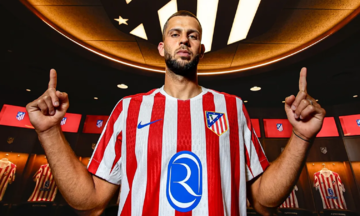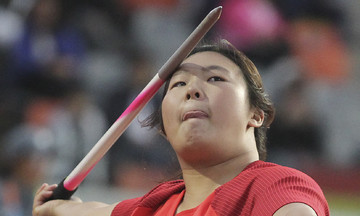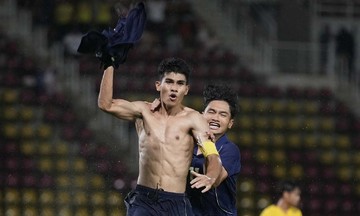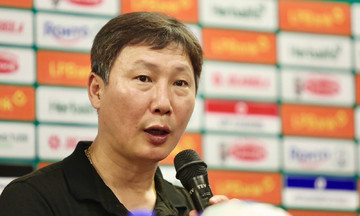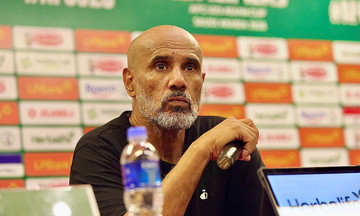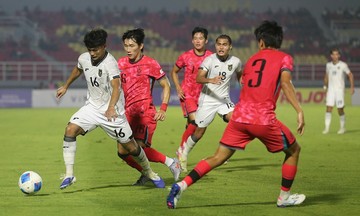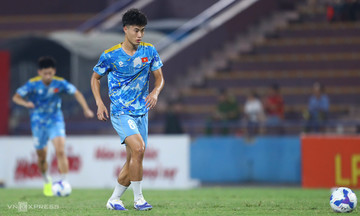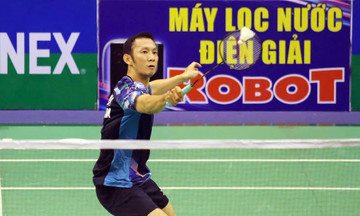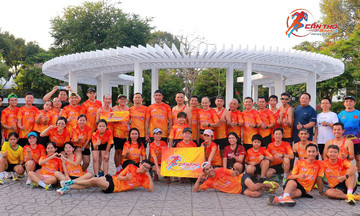Several key points stand out in the South American World Cup 2026 qualifiers before the final matchday. First is Argentina's dominance, leading the table by 10 points. The 2022 World Cup champions secured their place in the tournament five matchdays early, in 3/2025.
Second is the tight competition among the remaining teams. While Chile and Peru are eliminated, Venezuela and Bolivia still have a chance to compete for the seventh-place intercontinental playoff spot. Above them, five teams—Brazil, Uruguay, Ecuador, Colombia, and Paraguay—are separated by a maximum of three points, although all will qualify for the tournament in North America in the summer of 2026.
As things stand, Brazil sits second with 28 points. However, a crucial detail is often overlooked: Ecuador's point deduction. Nicknamed "La Tricolor" (The Tricolor), Ecuador currently trails Brazil by two points, placing them in the chasing pack. In reality, Ecuador began the qualifiers with a three-point penalty due to using falsified documents for player Byron Castillo during the 2022 World Cup qualifiers.
Based purely on their on-field performance, Ecuador would be second in South America with 29 points. They have lost only two matches—a record even better than the leaders—and those losses came away to Argentina and Brazil.
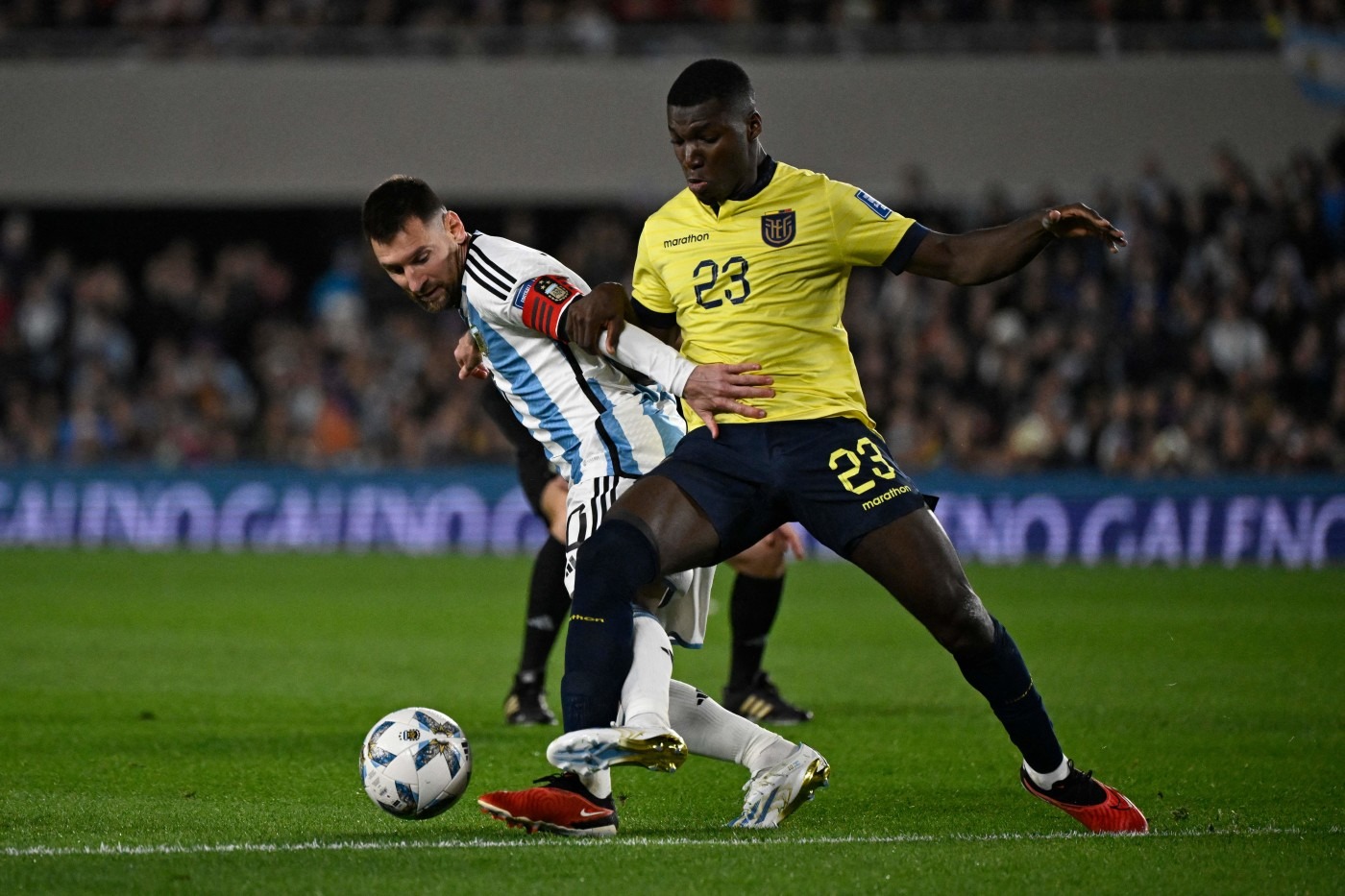 |
Midfielder Caicedo tackles Messi during Ecuador's 0-1 loss to Argentina in the South American World Cup 2026 qualifiers on 8/9/2023. Photo: AFP |
Midfielder Caicedo tackles Messi during Ecuador's 0-1 loss to Argentina in the South American World Cup 2026 qualifiers on 8/9/2023. Photo: AFP
Since taking over from Felix Sanchez in August 2024, Argentinian coach Sebastian Beccacece has led Ecuador on a 10-match unbeaten run, the longest in the team's history. Regardless of the outcome of their final match against Argentina tomorrow morning, 10/9, Ecuador will be a force to be reckoned with in South American football when the 2026 World Cup kicks off in the USA, Canada, and Mexico next summer.
At the pre-match press conference, Argentinian coach Lionel Scaloni praised Ecuador, stating, "They worry me in every aspect. For me, Ecuador is one of the best national teams in the world right now, with many excellent players".
What the 44-year-old Beccacece has achieved with Ecuador is already commendable. However, he and his players are aiming even higher. "We are excited and proud because qualifying for the World Cup is not easy," Beccacece said. "This is only the fifth time Ecuador has participated in this tournament. Just thinking about it moves me. The players also understand the importance of this achievement, but they don't want to stop there. We want to make next year's World Cup the most successful tournament in Ecuadorian football history."
In their four previous World Cup appearances (2002, 2006, 2014, 2022), Ecuador's best result was reaching the round of 16 in Germany in 2006. Beccacece's team aims to surpass this milestone. However, the expansion of the 2026 World Cup to 48 teams means a longer and more challenging road, with a round of 32 preceding the round of 16.
"Our general feeling now is that Ecuador is in a position to make history," Beccacece continued. "We cherish the World Cup ticket, celebrate it, but we are already thinking about taking another step forward. The whole team is not satisfied with what we have achieved, and there are exciting challenges ahead."
Ecuador has been on an upward trajectory for a long time. From November 2017 to July 2024, they climbed from 71st in the FIFA rankings—below Haiti, Guinea, and Cape Verde—to 27th. Significant progress came under coaches Gustavo Alfaro and Felix Sanchez, who unfortunately lost his job after the 2024 Copa America. In that tournament, Ecuador advanced past the group stage but was eliminated by Argentina in a penalty shootout in the quarterfinals.
"That Ecuadorian team was unlucky," Beccacece commented. "They faced the strongest team in the world and could have gone further. But that outcome also had a positive side. Ecuador was in a building phase, needing to experience moments of pain, difficulty, and disappointment."
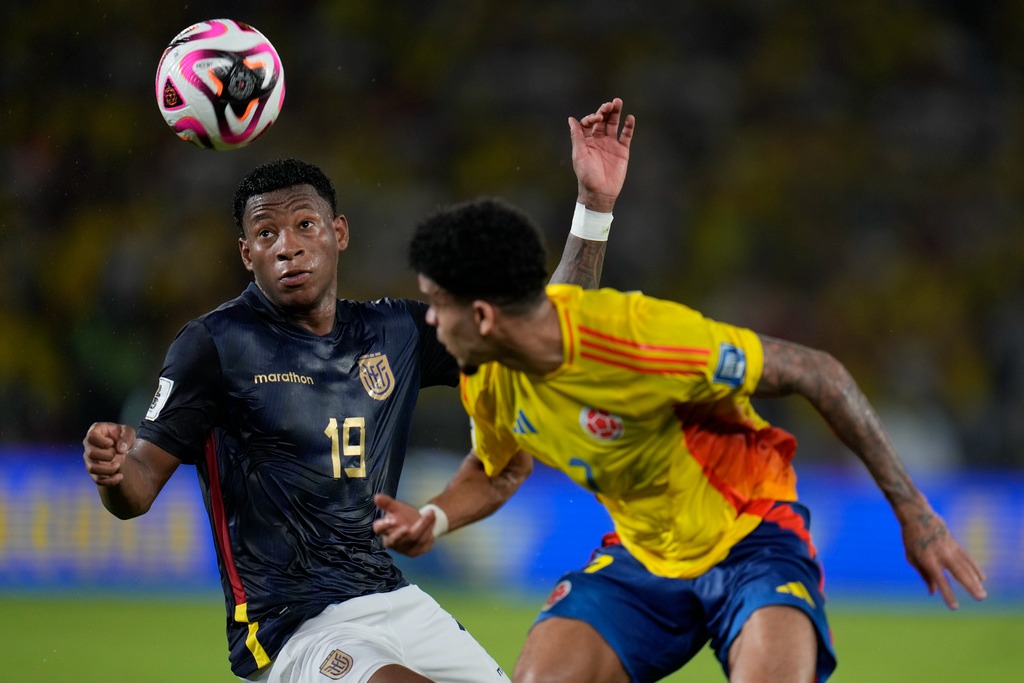 |
Wing-back Gonzalo Plata (19) tackles Luis Diaz during Ecuador's away match against Colombia in the South American World Cup 2026 qualifiers on 19/11/2024. Photo: AFP |
Wing-back Gonzalo Plata (19) tackles Luis Diaz during Ecuador's away match against Colombia in the South American World Cup 2026 qualifiers on 19/11/2024. Photo: AFP
Upon taking the job, Beccacece told his players that Ecuador could match Uruguay and Colombia, two teams with rich traditions. He believes they have achieved that goal. "We played very well away against Colombia and Uruguay, something the team hadn't done before. I believe Ecuador has become stronger since 2024. Currently, we play better, more proactive football, trying to control the game with the ball instead of just focusing on defense," Beccacece affirmed.
However, this approach hasn't always yielded perfect results. Ecuador scored 4 goals against Bolivia in November 2024, but throughout the qualifiers, they have struggled to score and haven't won any other match by more than one goal. "La Tricolor" still relies on 35-year-old former West Ham striker Enner Valencia.
Conversely, Ecuador's strength lies in its exceptionally solid defense. Under Beccacece, they have conceded only two goals in 11 matches. The secret lies in the high quality of individual players, as Beccacece himself listed: veteran goalkeeper Hernan Galindez; center-backs Willian Pacho, Piero Hincapie, and Felix Torres; wing-backs Pervis Estupinan and Joel Ordonez; and defensive midfielder Moises Caicedo. Many of these players represent major European clubs.
"They play fiercely, bravely, are good in one-on-one situations, and have speed," Beccacece analyzed. "But the team also needs a well-organized structure, starting from the front line. The forwards are the first line of defense. For example, in the 0-0 draw at home against Brazil, we organized high pressing and regained control of the ball."
Beccacece, with his rock star-like long hair, hails from the same region as Scaloni and Lionel Messi. After working in Newell's Old Boys' youth academy, he rose to prominence as Jorge Sampaoli's assistant. They worked together at club level for seven years before moving to the national team level, helping Chile win their first Copa America in 2015 and later reuniting with the Argentinian national team.
Beccacece believes that his experience at two World Cups—with Chile in 2014 and Argentina in 2018—as an assistant will be very helpful next summer. "It's valuable experience," he said. "I've prepared for pre-tournament friendlies, considered locations and travel plans, allocated time between matches at the World Cup. I haven't just heard about it; I've experienced it myself. It's practical experience, and I will try to use it to help Ecuador."
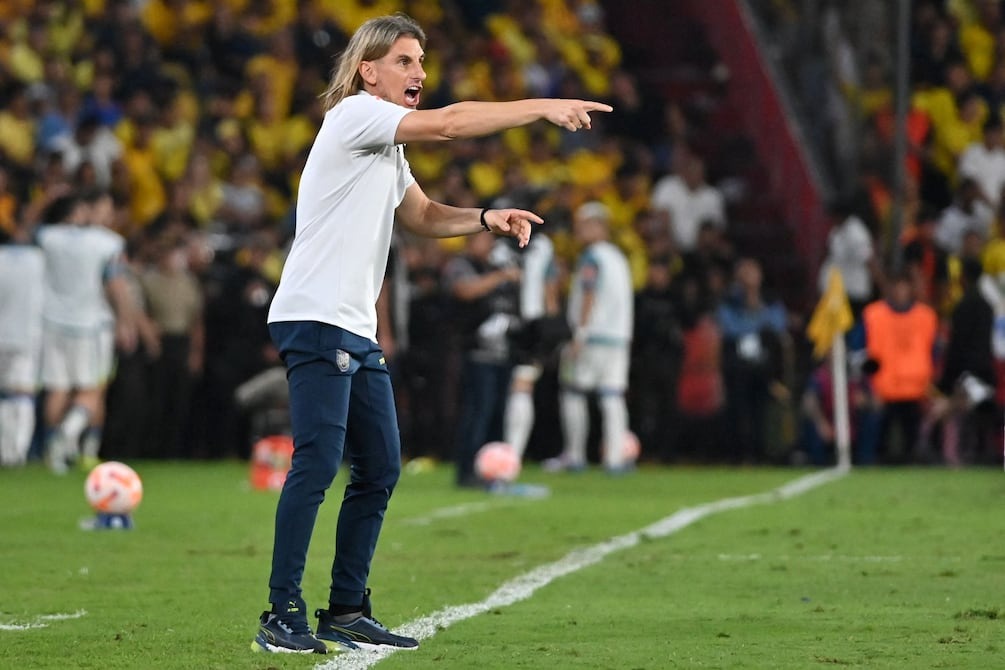 |
Coach Sebastian Beccacece gives instructions during a South American World Cup 2026 qualifier match. Photo: AFP |
Coach Sebastian Beccacece gives instructions during a South American World Cup 2026 qualifier match. Photo: AFP
Beccacece's coaching record as a head coach is not particularly impressive, having only managed Defensa y Justicia, Independiente, and Racing in Argentina, as well as Elche in Spain. However, the Ecuadorian Football Federation placed their full trust in him, and it has paid off.
"My view of football is holistic," the 44-year-old coach said. "Attacking and defending are inseparable. The better we play when we have the ball, the easier it is to win it back. When we make more than two passes, the team creates order on the pitch, and when we lose the ball, someone is in the right position to recover it. Ecuador now plays higher up the pitch, a few meters further forward. We have significantly increased our ball possession, especially at home, and cope better against teams that play deep. The difference also lies in physical fitness. In the away matches against Uruguay and Colombia, the team balanced the game."
Ecuador's current success is not just an isolated story of the national team. The Ecuadorian domestic league is developing, led by Independiente del Valle. This club has wisely utilized its partnership and investment from Qatar's Aspire Academy to become a pioneer in developing young talent in South America. Caicedo, Hincapie, and Pacho are prime examples from their academy in recent years.
"We cannot ignore the behind-the-scenes efforts: improving selection, education, and training," Beccacece said. "The Ecuadorian league is becoming more prestigious. In Europe, Ecuadorian football is also more highly regarded. Nowadays, talented players no longer have to go through Argentina but can go directly to Europe. Caicedo, Hincapie, Pacho, Kendry Paez... have proven that Ecuadorians can do it. That spreads belief. Ecuadorian children now have idols to emulate."
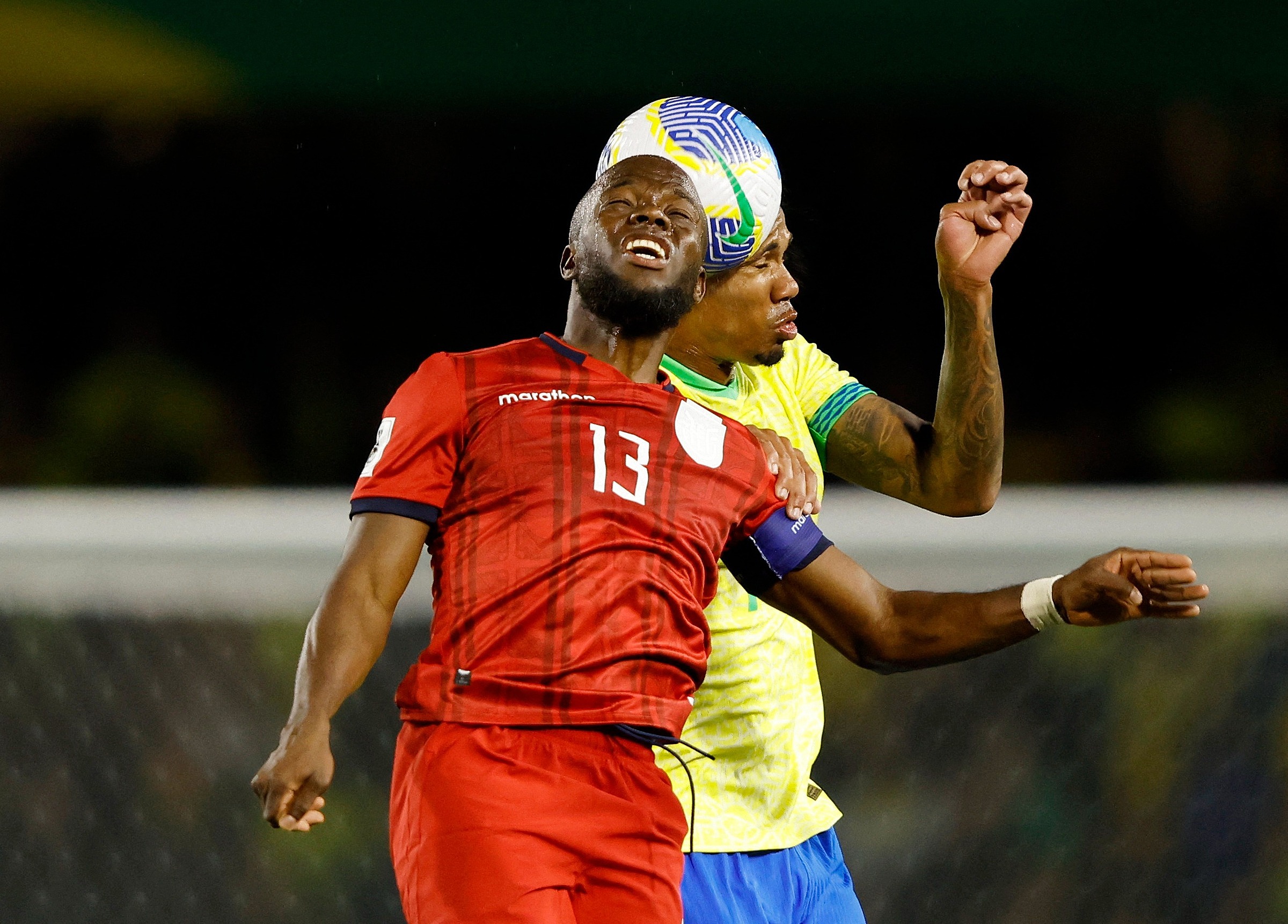 |
Forward Caicedo contests a header with center-back Gabriel during Ecuador's away match against Brazil in the 2026 World Cup qualifiers on 6/9/2024. Photo: Reuters |
Forward Caicedo contests a header with center-back Gabriel during Ecuador's away match against Brazil in the 2026 World Cup qualifiers on 6/9/2024. Photo: Reuters
Beccacece consistently tries to convey this belief, such as hosting World Cup qualifiers in Guayaquil, abandoning the long-standing advantage of playing in the capital Quito at an altitude of 2,850 meters above sea level.
"We played at low altitude against Bolivia and Brazil, and it will be the same against Argentina," he said. "We want to prove that Ecuador can compete on equal terms with the big teams at normal altitude. When geography is no longer a decisive factor, the team can broaden its thinking and embrace challenges. There are risks, but for me, this is a qualitative step forward for Ecuadorian football. We dare to try new things, not feeling pressured because Ecuador is chasing its dream."
Compiled by Hoang Thong




